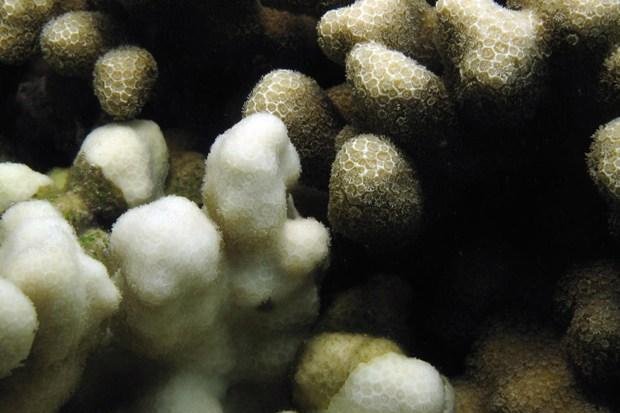Bleached and unbleached coral, juxtaposed. Photo by Raphael Ritson-Williams/University of Hawaii, Manoa
HONOLULU, June 23 (UPI) -- Like the human gut, a coral reef requires a proper bacterial community for optimum health. According to a new study in the journal Science, maintaining the presence of good bacteria could be key to protecting coral reefs from global warming.
"Healthy corals interact with complex communities of beneficial microbes or 'good bacteria,'" Tracy Ainsworth, researcher at the ARC Centre of Excellence for Coral Reef Studies at James Cook University, explained in a news release. "It is very likely that these microorganisms play a pivotal role in the capacity of coral to recover from bouts of bleaching caused by rising temperatures."
As with the human gut, how exactly good bacteria exert a positive influence on the health of their hosts isn't well understood by scientists.
"Corals rely on good bacteria but crucially we don't yet understand these microbes well enough to know how they influence coral survival," Ainsworth said.
But she and her colleagues are trying to change that. Their newly published study lays out what scientists currently know about coral bacteria and recommends how scientists can improve their understanding of coral-bacteria relationships.
"We know that lasting changes to the community of beneficial bacteria affects important aspects of the function of host organisms such as humans or corals, including their ability to withstand further stress," said Ainsworth, lead author of the new study.
She and her co-author Ruth Gates also know that the coral communities -- and the bacterial communities they sustain -- that survive climate change are likely to look much different than those found in the ocean today.
"Corals that survive the multiple impacts of climate change and local disturbance will form the basis of future reefs that will differ in fundamental ways from those considered healthy today," they wrote in their study. "Changes to the coral microbiome on these reefs will play a vital part in future coral reef health."
Ainsworth and Gates recently presented their latest findings concerning the coral microbiome to attendees at the 13th International Coral Reef Symposium, held this week in Honolulu.
As research into good coral bacteria continues, the basic strategy for maintaining coral reef health remains the same.
"Preventing physical contact with corals and maintaining high water quality on reefs during stress events will reduce stress loads on corals and creates the best case scenario for survival and recovery," said Gates.















